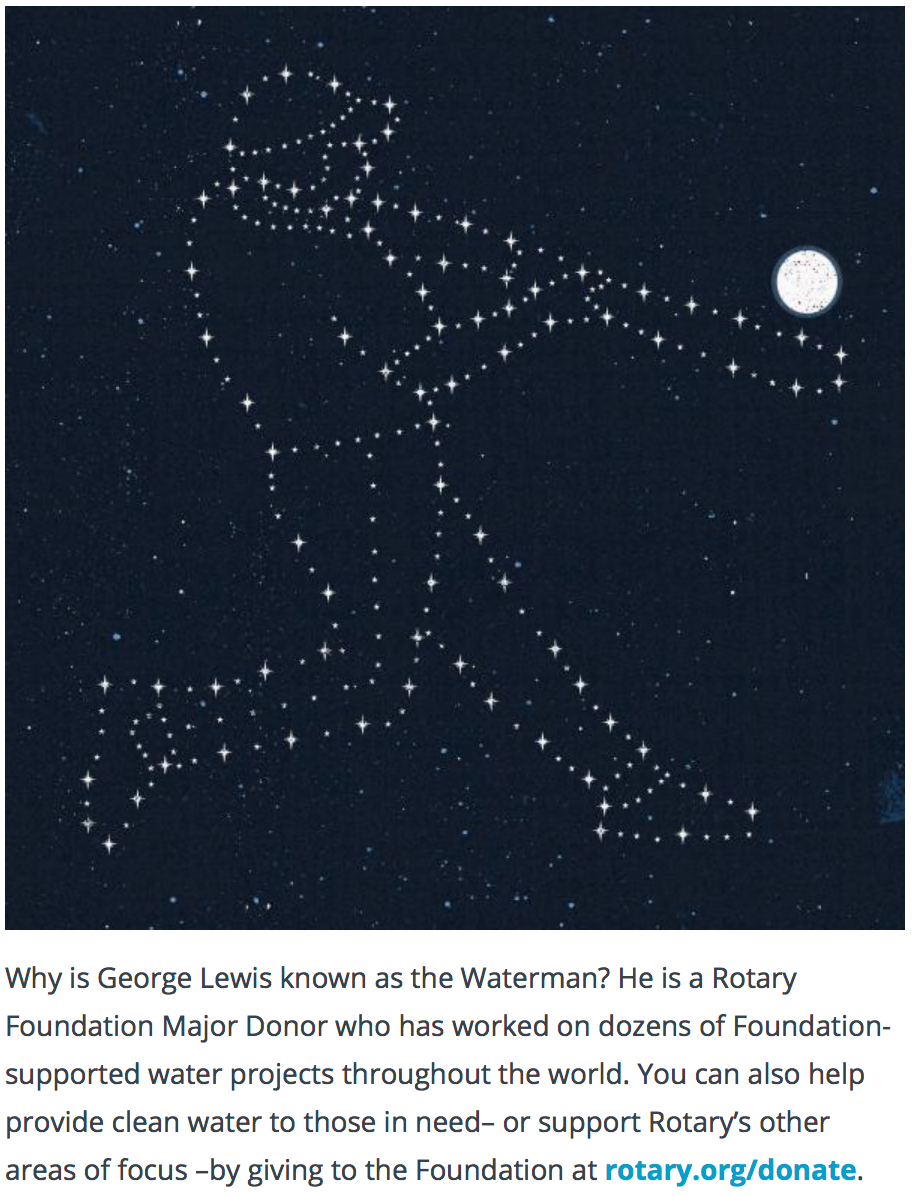.jpg)
Chase your baseball dream
George “the Waterman” Lewis, Rotary Club of Lakewood Ranch, Fla. (Published in The Rotarian - January 2018)
When I was growing up, not many people thought about going to college. So in 1952, when I graduated from Rahway High School in New Jersey, I knew what I was going to do: sign a contract to play baseball. I had made the varsity team for the Rahway Indians my freshman year, and in my sophomore year we won three major New Jersey championships. I was All State my junior and senior year, and team captain in my senior year. I was feeling pretty good.
In those days there were no drafts, but scouts for the major league teams were going around and looking at high school players. I had become friendly with a scout for the Boston Red Sox, and I ended up signing with them. They sent me to upstate New York to play in the All Star College League. It was my first time ever on an airplane, and I found myself sitting next to another young guy. Like me, he was a catcher, and he had some impressive credentials. This worried me. He might get the starting job ahead of me. I thought, “How can I be on the bench? I’m the best baseball player in the world.”
Things turned out differently than expected. In my first at-bat, I struck out on three pitches, and they sent me back home. I thought, “My life has ended.” I was practically crying.
 Fortunately, as part of my deal with the Red Sox, I received a scholarship to Wagner College on Staten Island. I continued playing baseball – at Wagner, where I was named All Conference each year in the Metropolitan league, with stints of summer ball in Maine and Nova Scotia.
Fortunately, as part of my deal with the Red Sox, I received a scholarship to Wagner College on Staten Island. I continued playing baseball – at Wagner, where I was named All Conference each year in the Metropolitan league, with stints of summer ball in Maine and Nova Scotia.
At the beginning of my senior year, the Red Sox signed me to another contract. I figured I would go to Wagner for the first half of my senior year, go to spring training in February, and finish college later. But at spring training, I hurt my knee, and when they sent me up to play with the minor league Corning (N.Y.) Red Sox, I had trouble crouching. I ended up playing in the outfield. I had been a great catcher, but I was only OK in the outfield. Still, I hit 32 home runs – more than any other player in the Red Sox organization that year – batted over .300, and had 100 RBIs. In my mind, I was going to make it.
In Corning, if you played for the Red Sox, you were a hero. People looked up to you, asked for your autograph. If you walk-ed into a restaurant, everyone knew you.
That’s when I got drafted into the Army. I did my training at Fort Dix in New Jersey, and after I finished, the Red Sox arranged for me to stay there. There were a lot of other professional players there, and we played exhibition games. Not many of them made it big, though I did go out drinking a few times with two future pitchers for the Dodgers: Sandy Koufax and Don Drysdale. I really liked Koufax; he was a nice guy. And he had huge hands. His hands were twice as big as mine.
When I got out of the Army in 1960, I thought about leaving baseball. I figured I was already too old. I ended up playing anyway, first for the Allentown (Pa.) Red Sox and then the Raleigh (N.C.) Capitals. That’s where I roomed with Carl Yastrzemski. He had just finished his freshman year at Notre Dame, but he already had that beautiful swing. When the Red Sox asked the great Ted Williams if he could help Yaz with his swing, he shouted back, “No! Don’t mess with that swing!”
We played all night games in the minors, except for a day game on Sundays. We played in old stadiums, and if they got 2,000 people, that was a lot. The lights were bad, and it was tough to see the ball. When I played in Corning, the teams were pretty close to one another, so the travel wasn’t bad. But when I was in Allentown, the teams were spread out, and as soon as a game was over, we would get on the bus. I got paid $450 a month, which wasn’t too bad for 1959. My first job after baseball, with Texaco, paid $400 a month.
After Allentown I went to the Savannah (Ga.) Pirates. I was good but not good enough. That’s when I decided to quit. The Red Sox sent me another contract, but I never signed it. I felt lousy, but I realized I was just fooling myself.
Life should be an exciting adventure, and that’s how I lived my life. I regret not making it to the majors, but at least I had the opportunity. I hated losing those prime years to the Army, especially right after having had such a great year in Corning. But it was a great experience. I was a poor kid from Rahway. Baseball gave me everything.
As told to Geoff Johnson